Leadership and Management for Service Industry: Skills & Theories
VerifiedAdded on 2022/11/24
|11
|3421
|104
Report
AI Summary
This report provides an overview of leadership and management in the service industry, focusing on classical management theories and their application to the service sector, particularly in the context of The Ned Hotels. It discusses various leadership styles, including democratic, autocratic, and transformational leadership, and examines how internal and external factors such as globalization, motivation, environmental impact, and religious influences can affect management styles. The report also highlights the hard and soft skills required for effective management and leadership in the hospitality industry, emphasizing the importance of management, human resource, project management, and computer skills. Finally, it touches upon the future management and leadership skills necessary for success in the evolving service sector, stressing the need for adaptability and continuous learning. Desklib offers a wealth of resources for students, including solved assignments and past papers.
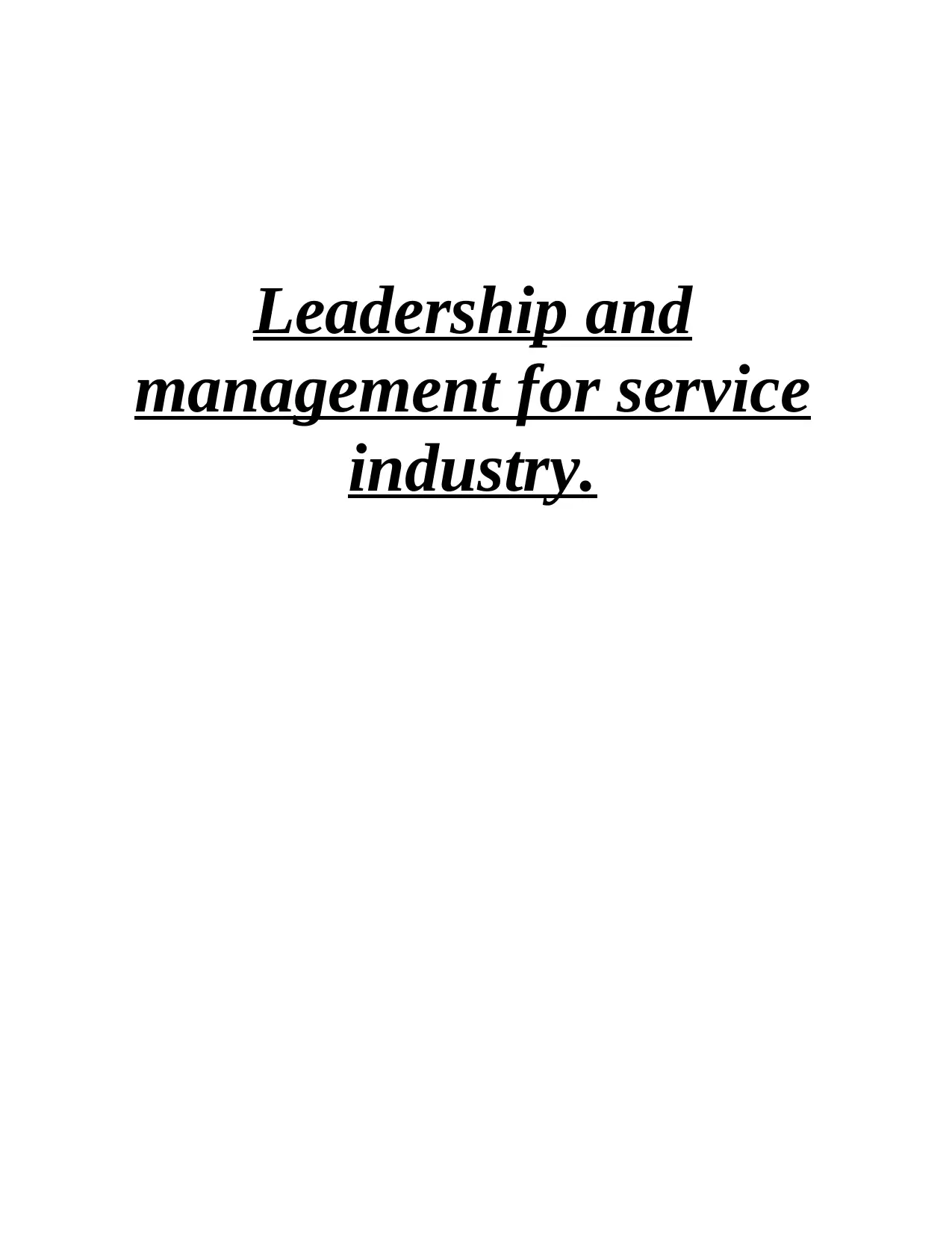
Leadership and
management for service
industry.
management for service
industry.
Paraphrase This Document
Need a fresh take? Get an instant paraphrase of this document with our AI Paraphraser
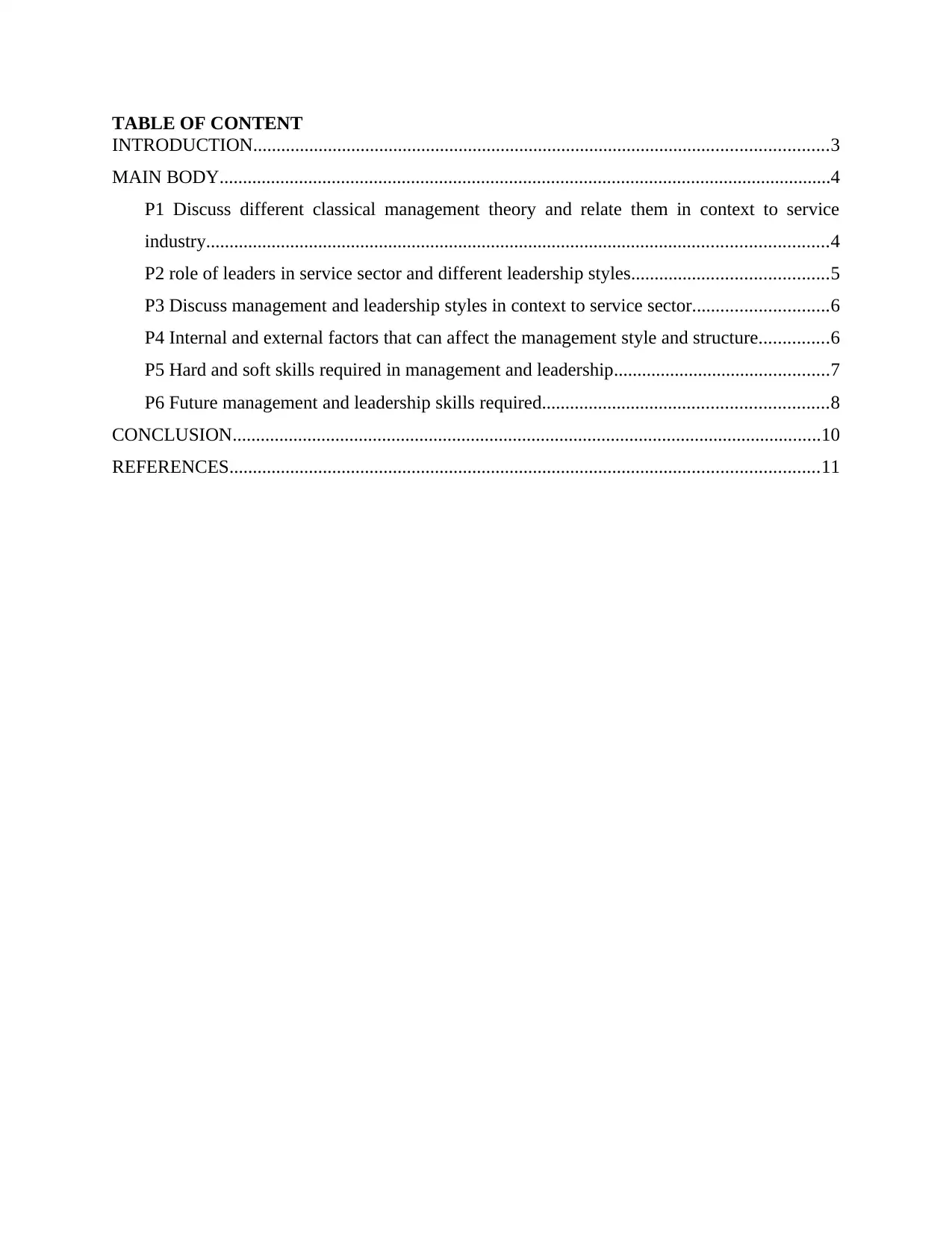
TABLE OF CONTENT
INTRODUCTION...........................................................................................................................3
MAIN BODY...................................................................................................................................4
P1 Discuss different classical management theory and relate them in context to service
industry.....................................................................................................................................4
P2 role of leaders in service sector and different leadership styles..........................................5
P3 Discuss management and leadership styles in context to service sector.............................6
P4 Internal and external factors that can affect the management style and structure...............6
P5 Hard and soft skills required in management and leadership..............................................7
P6 Future management and leadership skills required.............................................................8
CONCLUSION..............................................................................................................................10
REFERENCES..............................................................................................................................11
INTRODUCTION...........................................................................................................................3
MAIN BODY...................................................................................................................................4
P1 Discuss different classical management theory and relate them in context to service
industry.....................................................................................................................................4
P2 role of leaders in service sector and different leadership styles..........................................5
P3 Discuss management and leadership styles in context to service sector.............................6
P4 Internal and external factors that can affect the management style and structure...............6
P5 Hard and soft skills required in management and leadership..............................................7
P6 Future management and leadership skills required.............................................................8
CONCLUSION..............................................................................................................................10
REFERENCES..............................................................................................................................11
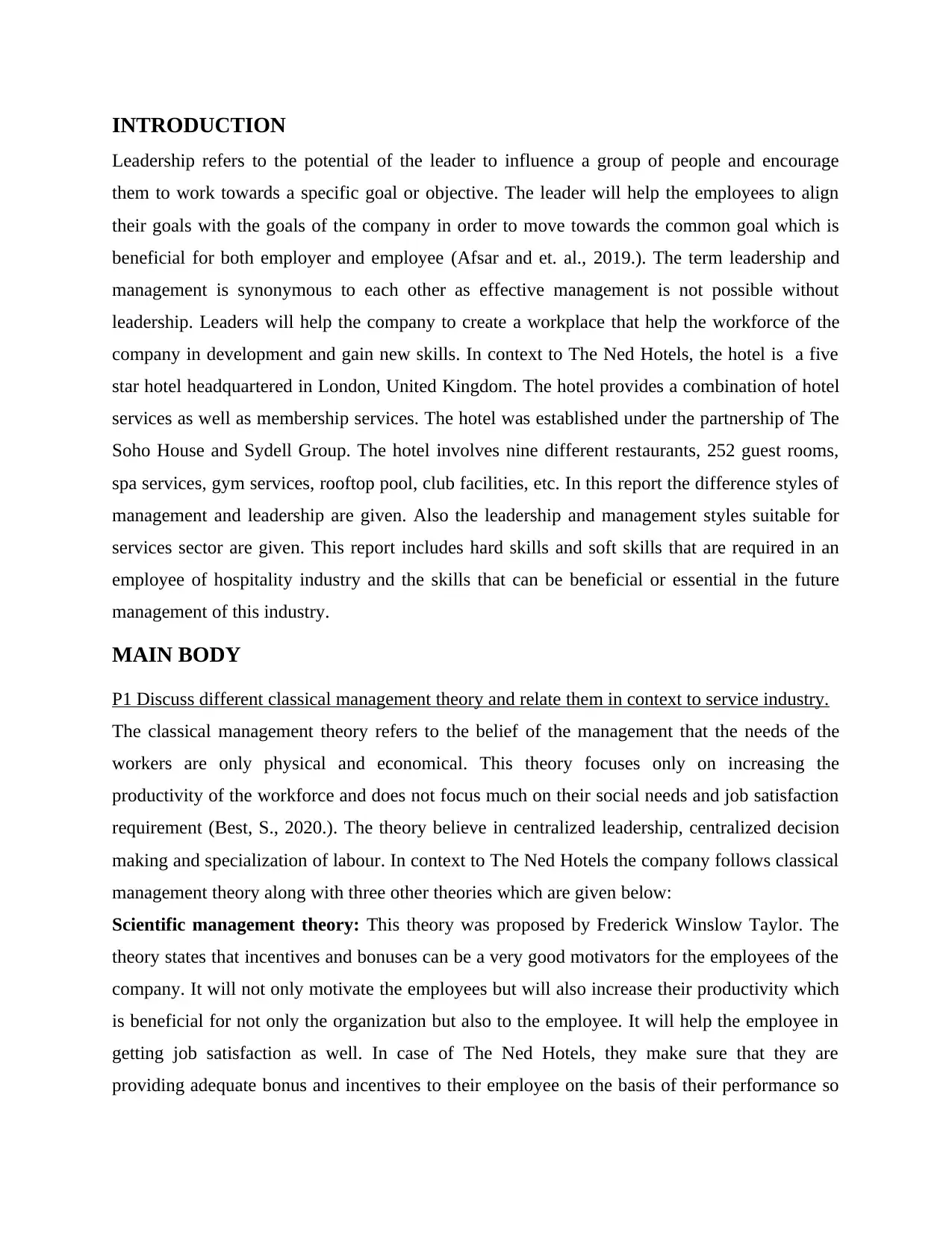
INTRODUCTION
Leadership refers to the potential of the leader to influence a group of people and encourage
them to work towards a specific goal or objective. The leader will help the employees to align
their goals with the goals of the company in order to move towards the common goal which is
beneficial for both employer and employee (Afsar and et. al., 2019.). The term leadership and
management is synonymous to each other as effective management is not possible without
leadership. Leaders will help the company to create a workplace that help the workforce of the
company in development and gain new skills. In context to The Ned Hotels, the hotel is a five
star hotel headquartered in London, United Kingdom. The hotel provides a combination of hotel
services as well as membership services. The hotel was established under the partnership of The
Soho House and Sydell Group. The hotel involves nine different restaurants, 252 guest rooms,
spa services, gym services, rooftop pool, club facilities, etc. In this report the difference styles of
management and leadership are given. Also the leadership and management styles suitable for
services sector are given. This report includes hard skills and soft skills that are required in an
employee of hospitality industry and the skills that can be beneficial or essential in the future
management of this industry.
MAIN BODY
P1 Discuss different classical management theory and relate them in context to service industry.
The classical management theory refers to the belief of the management that the needs of the
workers are only physical and economical. This theory focuses only on increasing the
productivity of the workforce and does not focus much on their social needs and job satisfaction
requirement (Best, S., 2020.). The theory believe in centralized leadership, centralized decision
making and specialization of labour. In context to The Ned Hotels the company follows classical
management theory along with three other theories which are given below:
Scientific management theory: This theory was proposed by Frederick Winslow Taylor. The
theory states that incentives and bonuses can be a very good motivators for the employees of the
company. It will not only motivate the employees but will also increase their productivity which
is beneficial for not only the organization but also to the employee. It will help the employee in
getting job satisfaction as well. In case of The Ned Hotels, they make sure that they are
providing adequate bonus and incentives to their employee on the basis of their performance so
Leadership refers to the potential of the leader to influence a group of people and encourage
them to work towards a specific goal or objective. The leader will help the employees to align
their goals with the goals of the company in order to move towards the common goal which is
beneficial for both employer and employee (Afsar and et. al., 2019.). The term leadership and
management is synonymous to each other as effective management is not possible without
leadership. Leaders will help the company to create a workplace that help the workforce of the
company in development and gain new skills. In context to The Ned Hotels, the hotel is a five
star hotel headquartered in London, United Kingdom. The hotel provides a combination of hotel
services as well as membership services. The hotel was established under the partnership of The
Soho House and Sydell Group. The hotel involves nine different restaurants, 252 guest rooms,
spa services, gym services, rooftop pool, club facilities, etc. In this report the difference styles of
management and leadership are given. Also the leadership and management styles suitable for
services sector are given. This report includes hard skills and soft skills that are required in an
employee of hospitality industry and the skills that can be beneficial or essential in the future
management of this industry.
MAIN BODY
P1 Discuss different classical management theory and relate them in context to service industry.
The classical management theory refers to the belief of the management that the needs of the
workers are only physical and economical. This theory focuses only on increasing the
productivity of the workforce and does not focus much on their social needs and job satisfaction
requirement (Best, S., 2020.). The theory believe in centralized leadership, centralized decision
making and specialization of labour. In context to The Ned Hotels the company follows classical
management theory along with three other theories which are given below:
Scientific management theory: This theory was proposed by Frederick Winslow Taylor. The
theory states that incentives and bonuses can be a very good motivators for the employees of the
company. It will not only motivate the employees but will also increase their productivity which
is beneficial for not only the organization but also to the employee. It will help the employee in
getting job satisfaction as well. In case of The Ned Hotels, they make sure that they are
providing adequate bonus and incentives to their employee on the basis of their performance so
⊘ This is a preview!⊘
Do you want full access?
Subscribe today to unlock all pages.

Trusted by 1+ million students worldwide
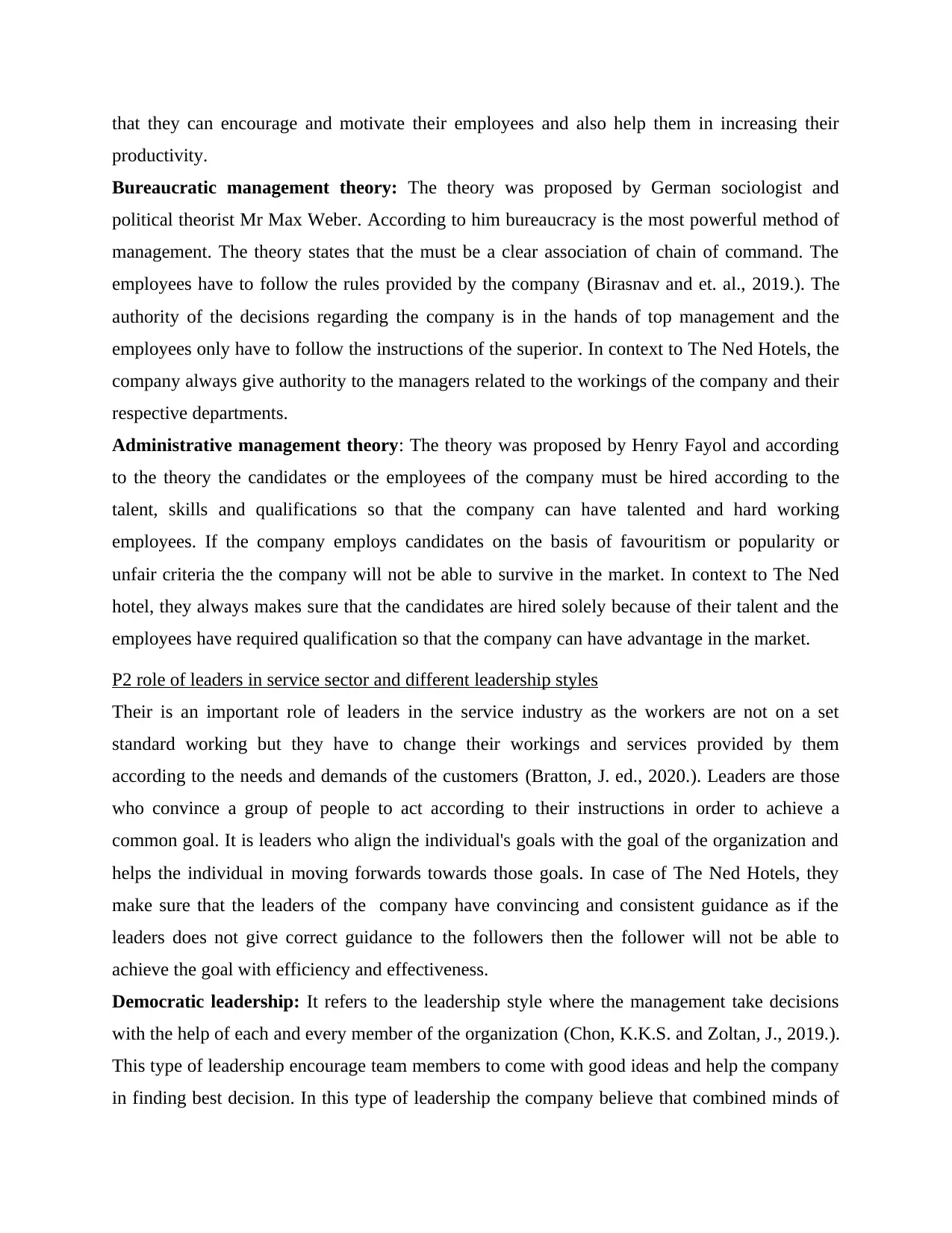
that they can encourage and motivate their employees and also help them in increasing their
productivity.
Bureaucratic management theory: The theory was proposed by German sociologist and
political theorist Mr Max Weber. According to him bureaucracy is the most powerful method of
management. The theory states that the must be a clear association of chain of command. The
employees have to follow the rules provided by the company (Birasnav and et. al., 2019.). The
authority of the decisions regarding the company is in the hands of top management and the
employees only have to follow the instructions of the superior. In context to The Ned Hotels, the
company always give authority to the managers related to the workings of the company and their
respective departments.
Administrative management theory: The theory was proposed by Henry Fayol and according
to the theory the candidates or the employees of the company must be hired according to the
talent, skills and qualifications so that the company can have talented and hard working
employees. If the company employs candidates on the basis of favouritism or popularity or
unfair criteria the the company will not be able to survive in the market. In context to The Ned
hotel, they always makes sure that the candidates are hired solely because of their talent and the
employees have required qualification so that the company can have advantage in the market.
P2 role of leaders in service sector and different leadership styles
Their is an important role of leaders in the service industry as the workers are not on a set
standard working but they have to change their workings and services provided by them
according to the needs and demands of the customers (Bratton, J. ed., 2020.). Leaders are those
who convince a group of people to act according to their instructions in order to achieve a
common goal. It is leaders who align the individual's goals with the goal of the organization and
helps the individual in moving forwards towards those goals. In case of The Ned Hotels, they
make sure that the leaders of the company have convincing and consistent guidance as if the
leaders does not give correct guidance to the followers then the follower will not be able to
achieve the goal with efficiency and effectiveness.
Democratic leadership: It refers to the leadership style where the management take decisions
with the help of each and every member of the organization (Chon, K.K.S. and Zoltan, J., 2019.).
This type of leadership encourage team members to come with good ideas and help the company
in finding best decision. In this type of leadership the company believe that combined minds of
productivity.
Bureaucratic management theory: The theory was proposed by German sociologist and
political theorist Mr Max Weber. According to him bureaucracy is the most powerful method of
management. The theory states that the must be a clear association of chain of command. The
employees have to follow the rules provided by the company (Birasnav and et. al., 2019.). The
authority of the decisions regarding the company is in the hands of top management and the
employees only have to follow the instructions of the superior. In context to The Ned Hotels, the
company always give authority to the managers related to the workings of the company and their
respective departments.
Administrative management theory: The theory was proposed by Henry Fayol and according
to the theory the candidates or the employees of the company must be hired according to the
talent, skills and qualifications so that the company can have talented and hard working
employees. If the company employs candidates on the basis of favouritism or popularity or
unfair criteria the the company will not be able to survive in the market. In context to The Ned
hotel, they always makes sure that the candidates are hired solely because of their talent and the
employees have required qualification so that the company can have advantage in the market.
P2 role of leaders in service sector and different leadership styles
Their is an important role of leaders in the service industry as the workers are not on a set
standard working but they have to change their workings and services provided by them
according to the needs and demands of the customers (Bratton, J. ed., 2020.). Leaders are those
who convince a group of people to act according to their instructions in order to achieve a
common goal. It is leaders who align the individual's goals with the goal of the organization and
helps the individual in moving forwards towards those goals. In case of The Ned Hotels, they
make sure that the leaders of the company have convincing and consistent guidance as if the
leaders does not give correct guidance to the followers then the follower will not be able to
achieve the goal with efficiency and effectiveness.
Democratic leadership: It refers to the leadership style where the management take decisions
with the help of each and every member of the organization (Chon, K.K.S. and Zoltan, J., 2019.).
This type of leadership encourage team members to come with good ideas and help the company
in finding best decision. In this type of leadership the company believe that combined minds of
Paraphrase This Document
Need a fresh take? Get an instant paraphrase of this document with our AI Paraphraser
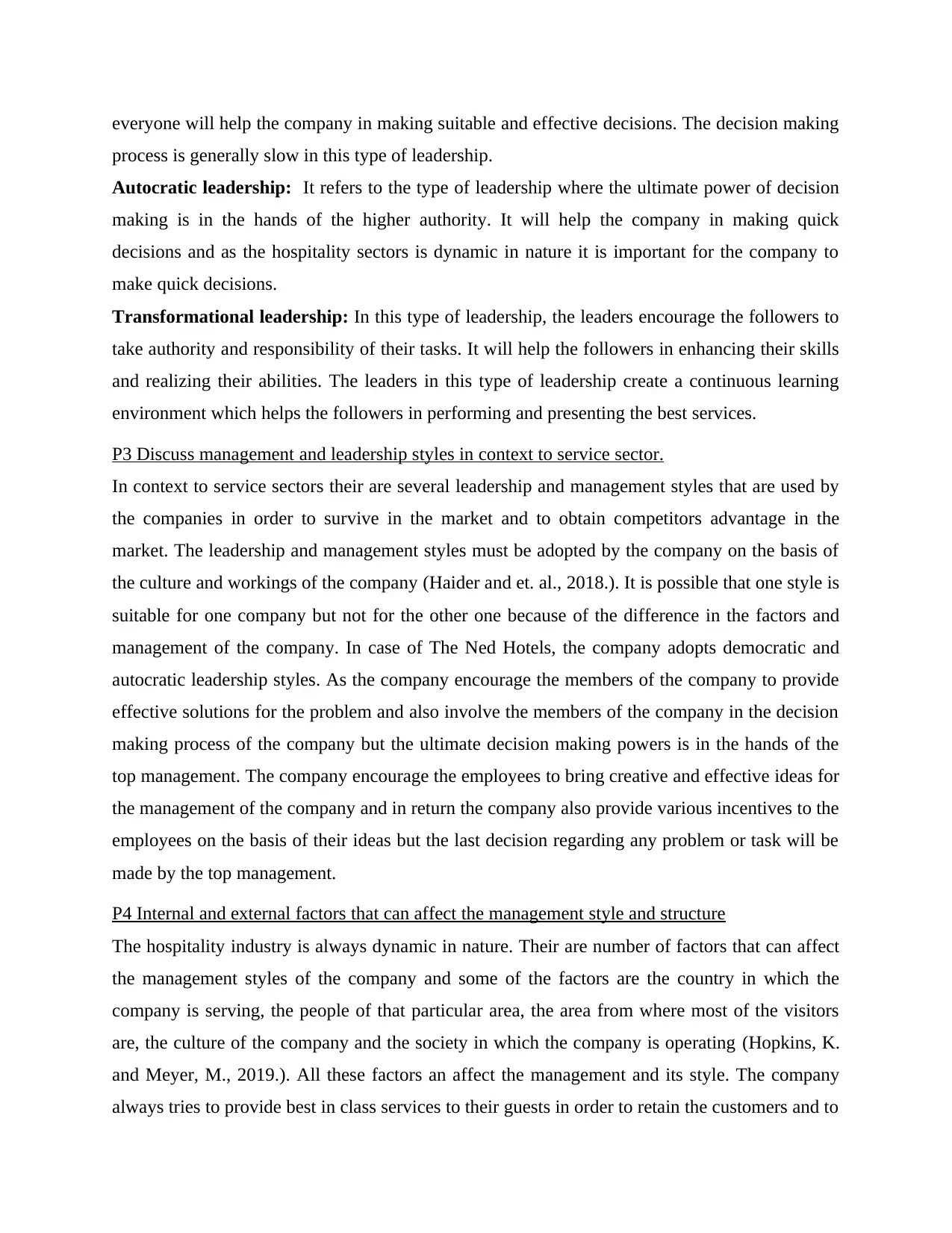
everyone will help the company in making suitable and effective decisions. The decision making
process is generally slow in this type of leadership.
Autocratic leadership: It refers to the type of leadership where the ultimate power of decision
making is in the hands of the higher authority. It will help the company in making quick
decisions and as the hospitality sectors is dynamic in nature it is important for the company to
make quick decisions.
Transformational leadership: In this type of leadership, the leaders encourage the followers to
take authority and responsibility of their tasks. It will help the followers in enhancing their skills
and realizing their abilities. The leaders in this type of leadership create a continuous learning
environment which helps the followers in performing and presenting the best services.
P3 Discuss management and leadership styles in context to service sector.
In context to service sectors their are several leadership and management styles that are used by
the companies in order to survive in the market and to obtain competitors advantage in the
market. The leadership and management styles must be adopted by the company on the basis of
the culture and workings of the company (Haider and et. al., 2018.). It is possible that one style is
suitable for one company but not for the other one because of the difference in the factors and
management of the company. In case of The Ned Hotels, the company adopts democratic and
autocratic leadership styles. As the company encourage the members of the company to provide
effective solutions for the problem and also involve the members of the company in the decision
making process of the company but the ultimate decision making powers is in the hands of the
top management. The company encourage the employees to bring creative and effective ideas for
the management of the company and in return the company also provide various incentives to the
employees on the basis of their ideas but the last decision regarding any problem or task will be
made by the top management.
P4 Internal and external factors that can affect the management style and structure
The hospitality industry is always dynamic in nature. Their are number of factors that can affect
the management styles of the company and some of the factors are the country in which the
company is serving, the people of that particular area, the area from where most of the visitors
are, the culture of the company and the society in which the company is operating (Hopkins, K.
and Meyer, M., 2019.). All these factors an affect the management and its style. The company
always tries to provide best in class services to their guests in order to retain the customers and to
process is generally slow in this type of leadership.
Autocratic leadership: It refers to the type of leadership where the ultimate power of decision
making is in the hands of the higher authority. It will help the company in making quick
decisions and as the hospitality sectors is dynamic in nature it is important for the company to
make quick decisions.
Transformational leadership: In this type of leadership, the leaders encourage the followers to
take authority and responsibility of their tasks. It will help the followers in enhancing their skills
and realizing their abilities. The leaders in this type of leadership create a continuous learning
environment which helps the followers in performing and presenting the best services.
P3 Discuss management and leadership styles in context to service sector.
In context to service sectors their are several leadership and management styles that are used by
the companies in order to survive in the market and to obtain competitors advantage in the
market. The leadership and management styles must be adopted by the company on the basis of
the culture and workings of the company (Haider and et. al., 2018.). It is possible that one style is
suitable for one company but not for the other one because of the difference in the factors and
management of the company. In case of The Ned Hotels, the company adopts democratic and
autocratic leadership styles. As the company encourage the members of the company to provide
effective solutions for the problem and also involve the members of the company in the decision
making process of the company but the ultimate decision making powers is in the hands of the
top management. The company encourage the employees to bring creative and effective ideas for
the management of the company and in return the company also provide various incentives to the
employees on the basis of their ideas but the last decision regarding any problem or task will be
made by the top management.
P4 Internal and external factors that can affect the management style and structure
The hospitality industry is always dynamic in nature. Their are number of factors that can affect
the management styles of the company and some of the factors are the country in which the
company is serving, the people of that particular area, the area from where most of the visitors
are, the culture of the company and the society in which the company is operating (Hopkins, K.
and Meyer, M., 2019.). All these factors an affect the management and its style. The company
always tries to provide best in class services to their guests in order to retain the customers and to
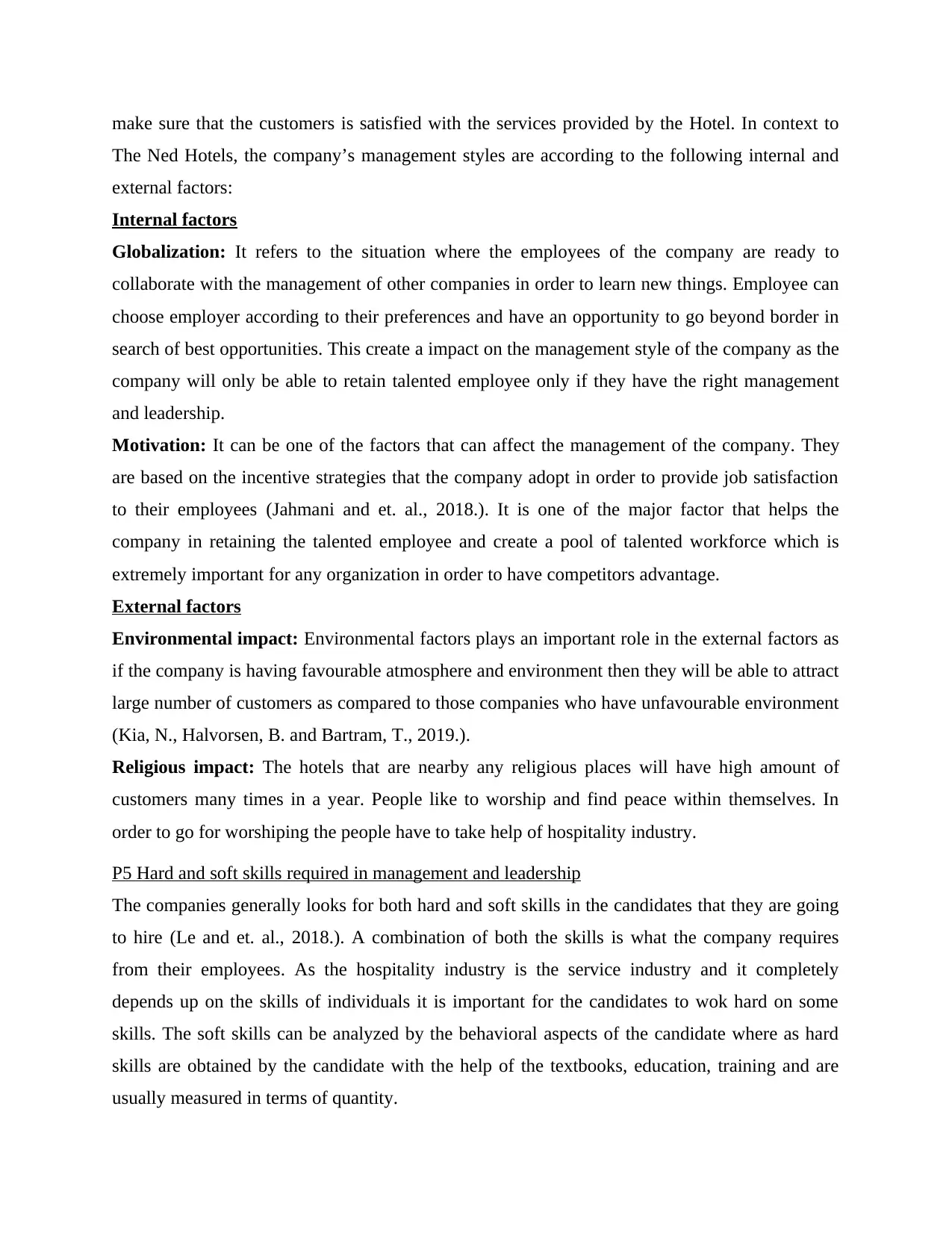
make sure that the customers is satisfied with the services provided by the Hotel. In context to
The Ned Hotels, the company’s management styles are according to the following internal and
external factors:
Internal factors
Globalization: It refers to the situation where the employees of the company are ready to
collaborate with the management of other companies in order to learn new things. Employee can
choose employer according to their preferences and have an opportunity to go beyond border in
search of best opportunities. This create a impact on the management style of the company as the
company will only be able to retain talented employee only if they have the right management
and leadership.
Motivation: It can be one of the factors that can affect the management of the company. They
are based on the incentive strategies that the company adopt in order to provide job satisfaction
to their employees (Jahmani and et. al., 2018.). It is one of the major factor that helps the
company in retaining the talented employee and create a pool of talented workforce which is
extremely important for any organization in order to have competitors advantage.
External factors
Environmental impact: Environmental factors plays an important role in the external factors as
if the company is having favourable atmosphere and environment then they will be able to attract
large number of customers as compared to those companies who have unfavourable environment
(Kia, N., Halvorsen, B. and Bartram, T., 2019.).
Religious impact: The hotels that are nearby any religious places will have high amount of
customers many times in a year. People like to worship and find peace within themselves. In
order to go for worshiping the people have to take help of hospitality industry.
P5 Hard and soft skills required in management and leadership
The companies generally looks for both hard and soft skills in the candidates that they are going
to hire (Le and et. al., 2018.). A combination of both the skills is what the company requires
from their employees. As the hospitality industry is the service industry and it completely
depends up on the skills of individuals it is important for the candidates to wok hard on some
skills. The soft skills can be analyzed by the behavioral aspects of the candidate where as hard
skills are obtained by the candidate with the help of the textbooks, education, training and are
usually measured in terms of quantity.
The Ned Hotels, the company’s management styles are according to the following internal and
external factors:
Internal factors
Globalization: It refers to the situation where the employees of the company are ready to
collaborate with the management of other companies in order to learn new things. Employee can
choose employer according to their preferences and have an opportunity to go beyond border in
search of best opportunities. This create a impact on the management style of the company as the
company will only be able to retain talented employee only if they have the right management
and leadership.
Motivation: It can be one of the factors that can affect the management of the company. They
are based on the incentive strategies that the company adopt in order to provide job satisfaction
to their employees (Jahmani and et. al., 2018.). It is one of the major factor that helps the
company in retaining the talented employee and create a pool of talented workforce which is
extremely important for any organization in order to have competitors advantage.
External factors
Environmental impact: Environmental factors plays an important role in the external factors as
if the company is having favourable atmosphere and environment then they will be able to attract
large number of customers as compared to those companies who have unfavourable environment
(Kia, N., Halvorsen, B. and Bartram, T., 2019.).
Religious impact: The hotels that are nearby any religious places will have high amount of
customers many times in a year. People like to worship and find peace within themselves. In
order to go for worshiping the people have to take help of hospitality industry.
P5 Hard and soft skills required in management and leadership
The companies generally looks for both hard and soft skills in the candidates that they are going
to hire (Le and et. al., 2018.). A combination of both the skills is what the company requires
from their employees. As the hospitality industry is the service industry and it completely
depends up on the skills of individuals it is important for the candidates to wok hard on some
skills. The soft skills can be analyzed by the behavioral aspects of the candidate where as hard
skills are obtained by the candidate with the help of the textbooks, education, training and are
usually measured in terms of quantity.
⊘ This is a preview!⊘
Do you want full access?
Subscribe today to unlock all pages.

Trusted by 1+ million students worldwide
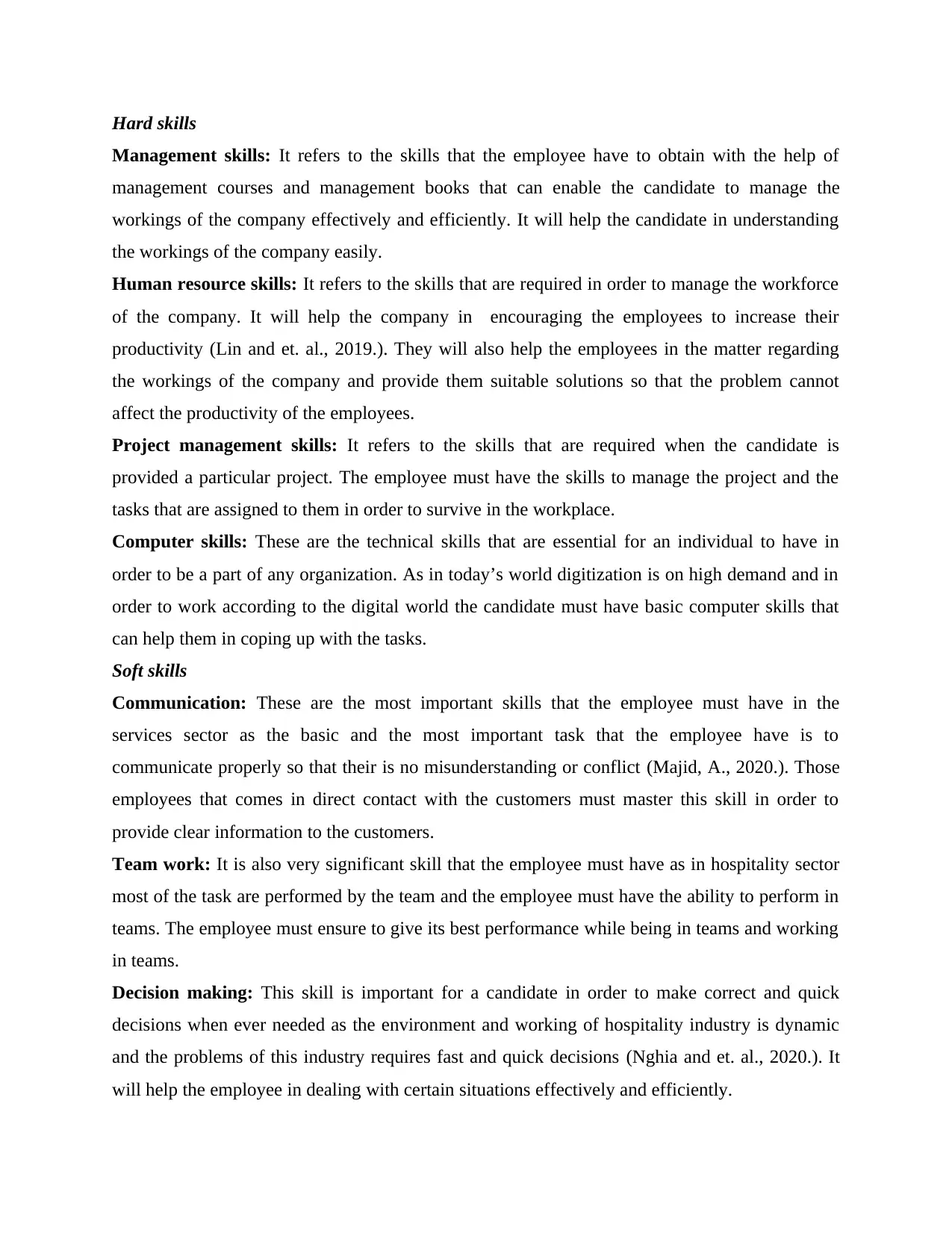
Hard skills
Management skills: It refers to the skills that the employee have to obtain with the help of
management courses and management books that can enable the candidate to manage the
workings of the company effectively and efficiently. It will help the candidate in understanding
the workings of the company easily.
Human resource skills: It refers to the skills that are required in order to manage the workforce
of the company. It will help the company in encouraging the employees to increase their
productivity (Lin and et. al., 2019.). They will also help the employees in the matter regarding
the workings of the company and provide them suitable solutions so that the problem cannot
affect the productivity of the employees.
Project management skills: It refers to the skills that are required when the candidate is
provided a particular project. The employee must have the skills to manage the project and the
tasks that are assigned to them in order to survive in the workplace.
Computer skills: These are the technical skills that are essential for an individual to have in
order to be a part of any organization. As in today’s world digitization is on high demand and in
order to work according to the digital world the candidate must have basic computer skills that
can help them in coping up with the tasks.
Soft skills
Communication: These are the most important skills that the employee must have in the
services sector as the basic and the most important task that the employee have is to
communicate properly so that their is no misunderstanding or conflict (Majid, A., 2020.). Those
employees that comes in direct contact with the customers must master this skill in order to
provide clear information to the customers.
Team work: It is also very significant skill that the employee must have as in hospitality sector
most of the task are performed by the team and the employee must have the ability to perform in
teams. The employee must ensure to give its best performance while being in teams and working
in teams.
Decision making: This skill is important for a candidate in order to make correct and quick
decisions when ever needed as the environment and working of hospitality industry is dynamic
and the problems of this industry requires fast and quick decisions (Nghia and et. al., 2020.). It
will help the employee in dealing with certain situations effectively and efficiently.
Management skills: It refers to the skills that the employee have to obtain with the help of
management courses and management books that can enable the candidate to manage the
workings of the company effectively and efficiently. It will help the candidate in understanding
the workings of the company easily.
Human resource skills: It refers to the skills that are required in order to manage the workforce
of the company. It will help the company in encouraging the employees to increase their
productivity (Lin and et. al., 2019.). They will also help the employees in the matter regarding
the workings of the company and provide them suitable solutions so that the problem cannot
affect the productivity of the employees.
Project management skills: It refers to the skills that are required when the candidate is
provided a particular project. The employee must have the skills to manage the project and the
tasks that are assigned to them in order to survive in the workplace.
Computer skills: These are the technical skills that are essential for an individual to have in
order to be a part of any organization. As in today’s world digitization is on high demand and in
order to work according to the digital world the candidate must have basic computer skills that
can help them in coping up with the tasks.
Soft skills
Communication: These are the most important skills that the employee must have in the
services sector as the basic and the most important task that the employee have is to
communicate properly so that their is no misunderstanding or conflict (Majid, A., 2020.). Those
employees that comes in direct contact with the customers must master this skill in order to
provide clear information to the customers.
Team work: It is also very significant skill that the employee must have as in hospitality sector
most of the task are performed by the team and the employee must have the ability to perform in
teams. The employee must ensure to give its best performance while being in teams and working
in teams.
Decision making: This skill is important for a candidate in order to make correct and quick
decisions when ever needed as the environment and working of hospitality industry is dynamic
and the problems of this industry requires fast and quick decisions (Nghia and et. al., 2020.). It
will help the employee in dealing with certain situations effectively and efficiently.
Paraphrase This Document
Need a fresh take? Get an instant paraphrase of this document with our AI Paraphraser
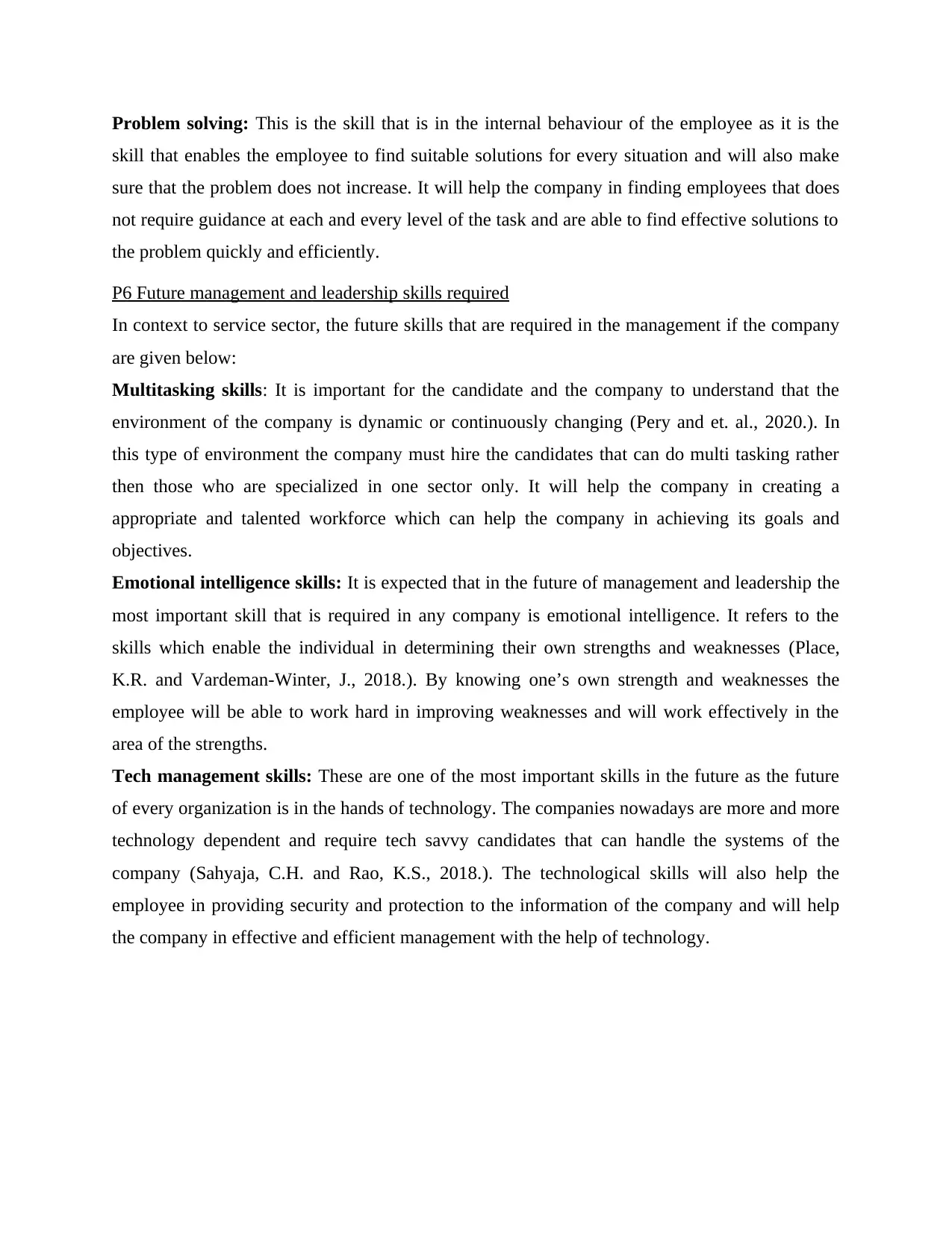
Problem solving: This is the skill that is in the internal behaviour of the employee as it is the
skill that enables the employee to find suitable solutions for every situation and will also make
sure that the problem does not increase. It will help the company in finding employees that does
not require guidance at each and every level of the task and are able to find effective solutions to
the problem quickly and efficiently.
P6 Future management and leadership skills required
In context to service sector, the future skills that are required in the management if the company
are given below:
Multitasking skills: It is important for the candidate and the company to understand that the
environment of the company is dynamic or continuously changing (Pery and et. al., 2020.). In
this type of environment the company must hire the candidates that can do multi tasking rather
then those who are specialized in one sector only. It will help the company in creating a
appropriate and talented workforce which can help the company in achieving its goals and
objectives.
Emotional intelligence skills: It is expected that in the future of management and leadership the
most important skill that is required in any company is emotional intelligence. It refers to the
skills which enable the individual in determining their own strengths and weaknesses (Place,
K.R. and Vardeman-Winter, J., 2018.). By knowing one’s own strength and weaknesses the
employee will be able to work hard in improving weaknesses and will work effectively in the
area of the strengths.
Tech management skills: These are one of the most important skills in the future as the future
of every organization is in the hands of technology. The companies nowadays are more and more
technology dependent and require tech savvy candidates that can handle the systems of the
company (Sahyaja, C.H. and Rao, K.S., 2018.). The technological skills will also help the
employee in providing security and protection to the information of the company and will help
the company in effective and efficient management with the help of technology.
skill that enables the employee to find suitable solutions for every situation and will also make
sure that the problem does not increase. It will help the company in finding employees that does
not require guidance at each and every level of the task and are able to find effective solutions to
the problem quickly and efficiently.
P6 Future management and leadership skills required
In context to service sector, the future skills that are required in the management if the company
are given below:
Multitasking skills: It is important for the candidate and the company to understand that the
environment of the company is dynamic or continuously changing (Pery and et. al., 2020.). In
this type of environment the company must hire the candidates that can do multi tasking rather
then those who are specialized in one sector only. It will help the company in creating a
appropriate and talented workforce which can help the company in achieving its goals and
objectives.
Emotional intelligence skills: It is expected that in the future of management and leadership the
most important skill that is required in any company is emotional intelligence. It refers to the
skills which enable the individual in determining their own strengths and weaknesses (Place,
K.R. and Vardeman-Winter, J., 2018.). By knowing one’s own strength and weaknesses the
employee will be able to work hard in improving weaknesses and will work effectively in the
area of the strengths.
Tech management skills: These are one of the most important skills in the future as the future
of every organization is in the hands of technology. The companies nowadays are more and more
technology dependent and require tech savvy candidates that can handle the systems of the
company (Sahyaja, C.H. and Rao, K.S., 2018.). The technological skills will also help the
employee in providing security and protection to the information of the company and will help
the company in effective and efficient management with the help of technology.
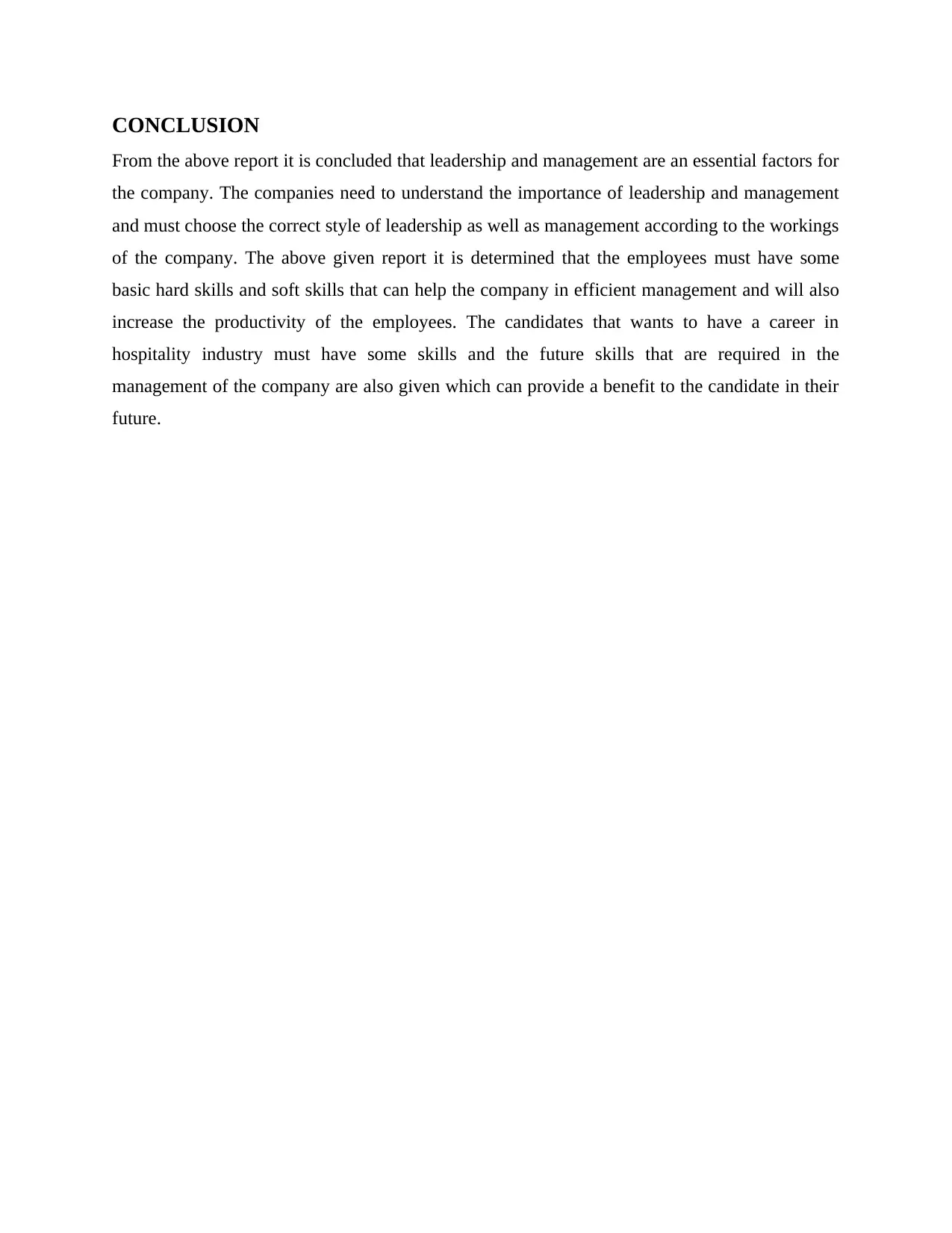
CONCLUSION
From the above report it is concluded that leadership and management are an essential factors for
the company. The companies need to understand the importance of leadership and management
and must choose the correct style of leadership as well as management according to the workings
of the company. The above given report it is determined that the employees must have some
basic hard skills and soft skills that can help the company in efficient management and will also
increase the productivity of the employees. The candidates that wants to have a career in
hospitality industry must have some skills and the future skills that are required in the
management of the company are also given which can provide a benefit to the candidate in their
future.
From the above report it is concluded that leadership and management are an essential factors for
the company. The companies need to understand the importance of leadership and management
and must choose the correct style of leadership as well as management according to the workings
of the company. The above given report it is determined that the employees must have some
basic hard skills and soft skills that can help the company in efficient management and will also
increase the productivity of the employees. The candidates that wants to have a career in
hospitality industry must have some skills and the future skills that are required in the
management of the company are also given which can provide a benefit to the candidate in their
future.
⊘ This is a preview!⊘
Do you want full access?
Subscribe today to unlock all pages.

Trusted by 1+ million students worldwide
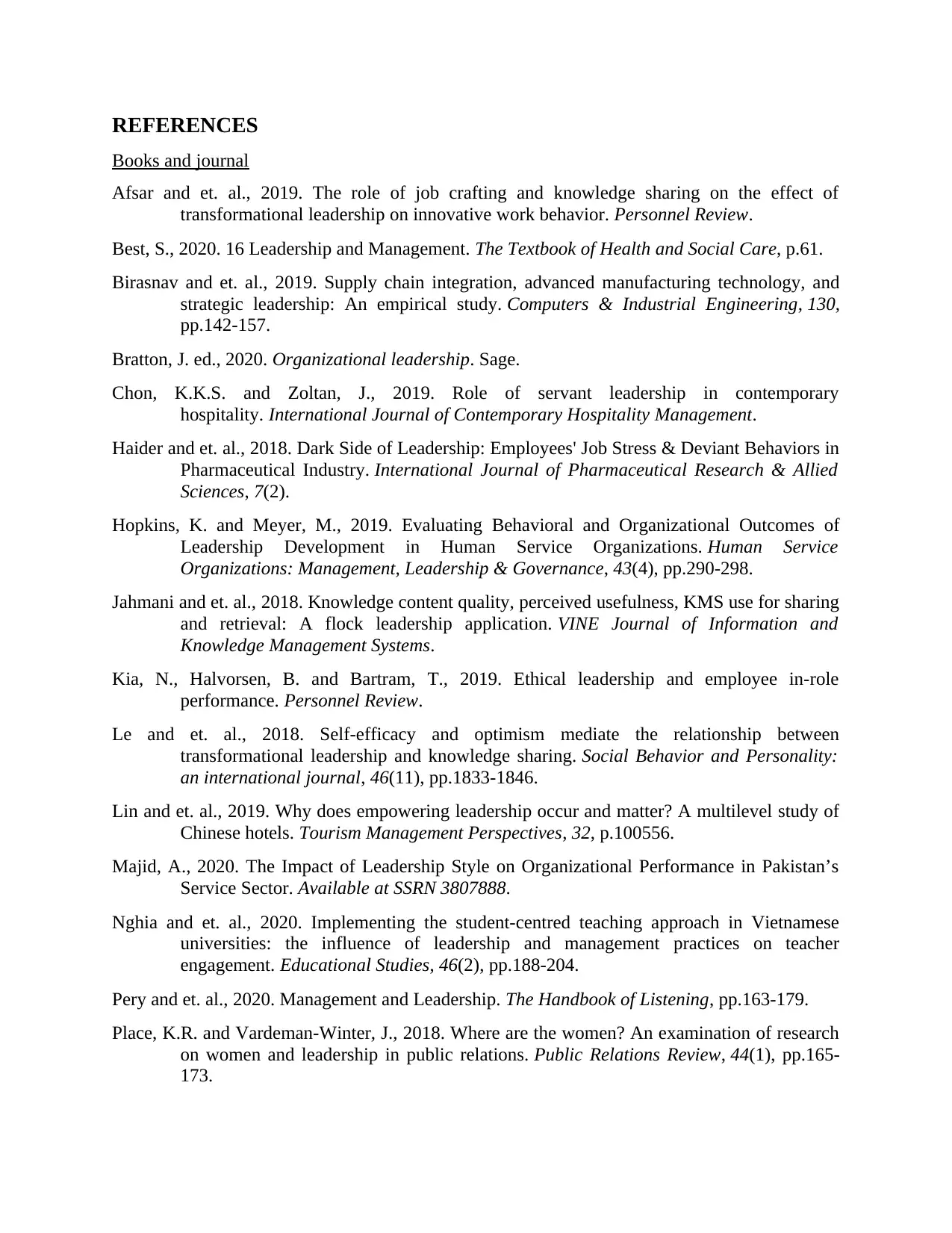
REFERENCES
Books and journal
Afsar and et. al., 2019. The role of job crafting and knowledge sharing on the effect of
transformational leadership on innovative work behavior. Personnel Review.
Best, S., 2020. 16 Leadership and Management. The Textbook of Health and Social Care, p.61.
Birasnav and et. al., 2019. Supply chain integration, advanced manufacturing technology, and
strategic leadership: An empirical study. Computers & Industrial Engineering, 130,
pp.142-157.
Bratton, J. ed., 2020. Organizational leadership. Sage.
Chon, K.K.S. and Zoltan, J., 2019. Role of servant leadership in contemporary
hospitality. International Journal of Contemporary Hospitality Management.
Haider and et. al., 2018. Dark Side of Leadership: Employees' Job Stress & Deviant Behaviors in
Pharmaceutical Industry. International Journal of Pharmaceutical Research & Allied
Sciences, 7(2).
Hopkins, K. and Meyer, M., 2019. Evaluating Behavioral and Organizational Outcomes of
Leadership Development in Human Service Organizations. Human Service
Organizations: Management, Leadership & Governance, 43(4), pp.290-298.
Jahmani and et. al., 2018. Knowledge content quality, perceived usefulness, KMS use for sharing
and retrieval: A flock leadership application. VINE Journal of Information and
Knowledge Management Systems.
Kia, N., Halvorsen, B. and Bartram, T., 2019. Ethical leadership and employee in-role
performance. Personnel Review.
Le and et. al., 2018. Self-efficacy and optimism mediate the relationship between
transformational leadership and knowledge sharing. Social Behavior and Personality:
an international journal, 46(11), pp.1833-1846.
Lin and et. al., 2019. Why does empowering leadership occur and matter? A multilevel study of
Chinese hotels. Tourism Management Perspectives, 32, p.100556.
Majid, A., 2020. The Impact of Leadership Style on Organizational Performance in Pakistan’s
Service Sector. Available at SSRN 3807888.
Nghia and et. al., 2020. Implementing the student-centred teaching approach in Vietnamese
universities: the influence of leadership and management practices on teacher
engagement. Educational Studies, 46(2), pp.188-204.
Pery and et. al., 2020. Management and Leadership. The Handbook of Listening, pp.163-179.
Place, K.R. and Vardeman-Winter, J., 2018. Where are the women? An examination of research
on women and leadership in public relations. Public Relations Review, 44(1), pp.165-
173.
Books and journal
Afsar and et. al., 2019. The role of job crafting and knowledge sharing on the effect of
transformational leadership on innovative work behavior. Personnel Review.
Best, S., 2020. 16 Leadership and Management. The Textbook of Health and Social Care, p.61.
Birasnav and et. al., 2019. Supply chain integration, advanced manufacturing technology, and
strategic leadership: An empirical study. Computers & Industrial Engineering, 130,
pp.142-157.
Bratton, J. ed., 2020. Organizational leadership. Sage.
Chon, K.K.S. and Zoltan, J., 2019. Role of servant leadership in contemporary
hospitality. International Journal of Contemporary Hospitality Management.
Haider and et. al., 2018. Dark Side of Leadership: Employees' Job Stress & Deviant Behaviors in
Pharmaceutical Industry. International Journal of Pharmaceutical Research & Allied
Sciences, 7(2).
Hopkins, K. and Meyer, M., 2019. Evaluating Behavioral and Organizational Outcomes of
Leadership Development in Human Service Organizations. Human Service
Organizations: Management, Leadership & Governance, 43(4), pp.290-298.
Jahmani and et. al., 2018. Knowledge content quality, perceived usefulness, KMS use for sharing
and retrieval: A flock leadership application. VINE Journal of Information and
Knowledge Management Systems.
Kia, N., Halvorsen, B. and Bartram, T., 2019. Ethical leadership and employee in-role
performance. Personnel Review.
Le and et. al., 2018. Self-efficacy and optimism mediate the relationship between
transformational leadership and knowledge sharing. Social Behavior and Personality:
an international journal, 46(11), pp.1833-1846.
Lin and et. al., 2019. Why does empowering leadership occur and matter? A multilevel study of
Chinese hotels. Tourism Management Perspectives, 32, p.100556.
Majid, A., 2020. The Impact of Leadership Style on Organizational Performance in Pakistan’s
Service Sector. Available at SSRN 3807888.
Nghia and et. al., 2020. Implementing the student-centred teaching approach in Vietnamese
universities: the influence of leadership and management practices on teacher
engagement. Educational Studies, 46(2), pp.188-204.
Pery and et. al., 2020. Management and Leadership. The Handbook of Listening, pp.163-179.
Place, K.R. and Vardeman-Winter, J., 2018. Where are the women? An examination of research
on women and leadership in public relations. Public Relations Review, 44(1), pp.165-
173.
Paraphrase This Document
Need a fresh take? Get an instant paraphrase of this document with our AI Paraphraser
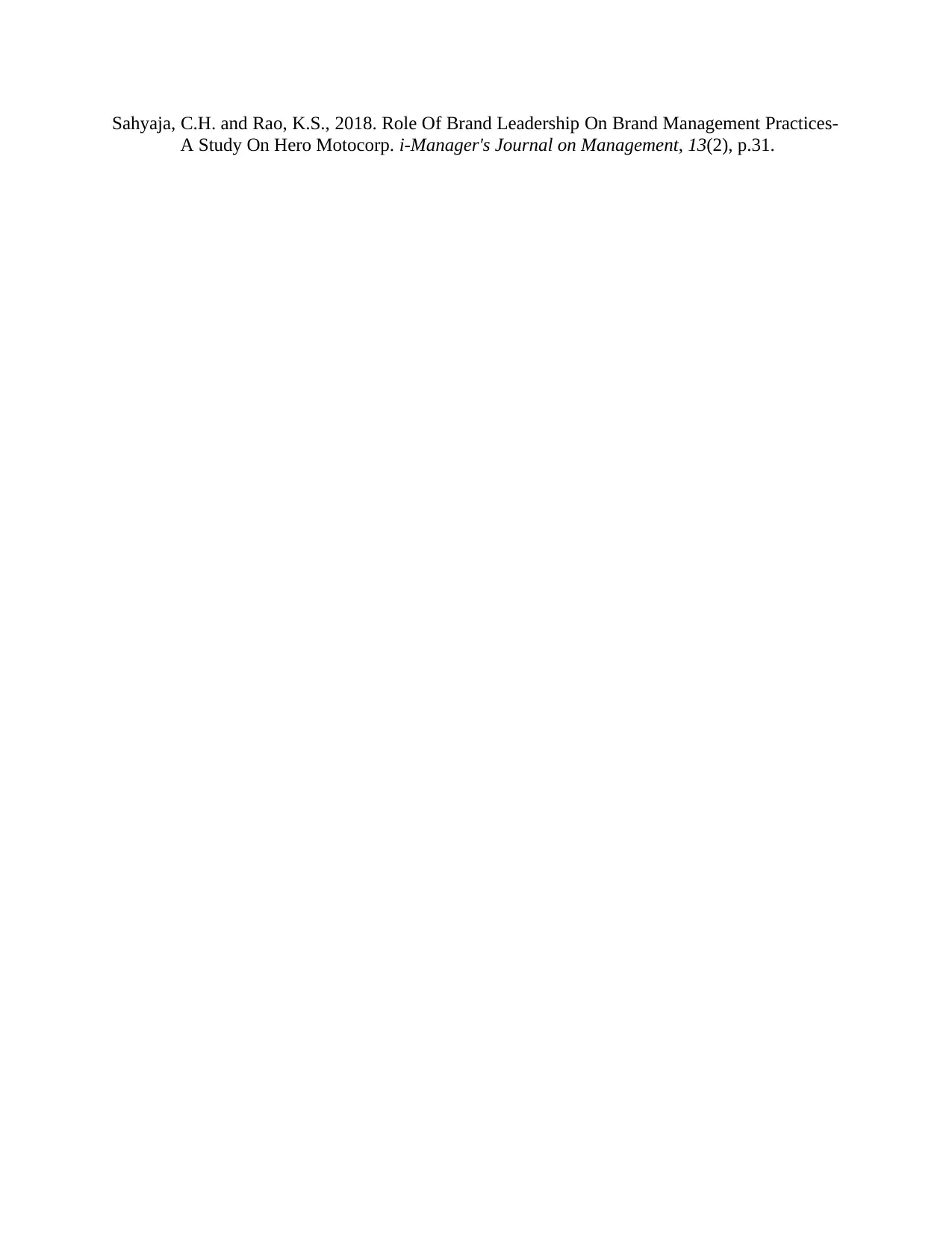
Sahyaja, C.H. and Rao, K.S., 2018. Role Of Brand Leadership On Brand Management Practices-
A Study On Hero Motocorp. i-Manager's Journal on Management, 13(2), p.31.
A Study On Hero Motocorp. i-Manager's Journal on Management, 13(2), p.31.
1 out of 11
Related Documents
Your All-in-One AI-Powered Toolkit for Academic Success.
+13062052269
info@desklib.com
Available 24*7 on WhatsApp / Email
![[object Object]](/_next/static/media/star-bottom.7253800d.svg)
Unlock your academic potential
Copyright © 2020–2026 A2Z Services. All Rights Reserved. Developed and managed by ZUCOL.




